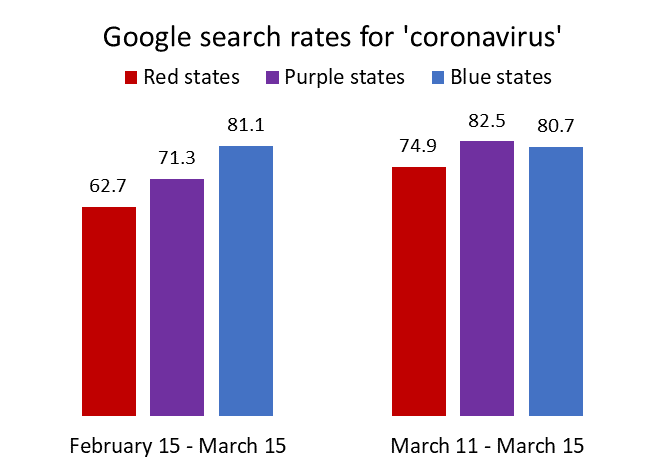President Trump has spent much of the past month playing down the coronavirus threat. He has repeatedly promoted the idea that the virus would suddenly disappear, accusing Democrats and the media of exaggerating health risks to hurt his reelection campaign.
The president’s fellow Republicans have followed his lead. As I noted in an earlier TMC post, Republicans have consistently been much less concerned about the coronavirus than Democrats.
Google search patterns reveal political divides
We can also see those differences in politicized Google search patterns for “coronavirus.” As you can see in the figure below, how strongly a state supported Donald Trump in 2016 was inversely related to how frequently its residents searched for “coronavirus” over the past month.

Sources: Google Trends; Dave Leip Election Atlas
More specifically, the display shows Google search rates were almost twice as high in states where Trump was least popular as they were in states where he won supermajorities of voters in 2016. In fact, Trump’s 2016 vote share explains over half the variation across the states in Google search rates for “coronavirus” in the past month.
Some astute analysts have argued that we have to be cautious about highly publicized polling showing that Democrats are a lot more concerned about the virus than Republicans. People could just be echoing their party’s point of view as a kind of partisan cheerleading — a phenomenon that is often described as “expressive survey response.”
The Google Trends data from the past month suggests otherwise. Indeed, partisan differences in coronavirus concerns have apparently seeped into Americans’ behavior even when no one was watching. Seth Stephens-Davidowitz’s economics research shows several ways in which Google searches predict subsequent actions.
Of course, correlation is not causation. We need to be cautious about trying to make inferences about individuals from state-level data, too. But these results give us some additional evidence that Republicans and residents of red states have not been taking the coronavirus threat as seriously as other Americans.
But those politicized search patterns have weakened
Sometimes, when a situation’s gravity becomes undeniable, reality can burst through the partisan bubble. Partisans, for example, almost always think that the economy is doing better when one of their own is in the White House. But those partisan disagreements over economic conditions shrink considerably during economic crises such as the Great Recession.
That may be happening now for the coronavirus. Since March 11, when the National Basketball Association suspended its season and much of the United States began shutting down over the pandemic’s immediate threat, statewide Google searches for the coronavirus looked very different from how they’ve looked for the past month.

Sources: Google Trends; Dave Leip Election Atlas
The figure above shows that “coronavirus” search patterns are much less partisan than they were previously. Search rates in “blue” states — states where Trump lost by more than five percentage points in 2016 — have remained high consistently. But coronavirus searches are catching up in both red states, where Trump won by more than five points, and purple states, decided by less than five points.
As the public health crisis has started affecting American life — shutting down professional and amateur sports and public events, and leading schools and businesses to send people home — red- and purple-state residents may now be taking the threat more seriously. Since Trump’s national emergency declaration and the House’s bipartisan passage of an emergency spending measure to combat the virus, that may well continue.
We don’t know whether the shrinking partisan gap in Google searches will also show up in public opinion. The latest poll continues to show large differences between Republicans’ and Democrats’ concerns about the virus. And the two groups will inevitably blame the pandemic’s spread on the other side — much as they selectively blamed each other for the financial collapse in 2008.
But for now, at least, there is some hope that red- and purple-state residents are catching up to blue states in seeking out information about the coronavirus.



